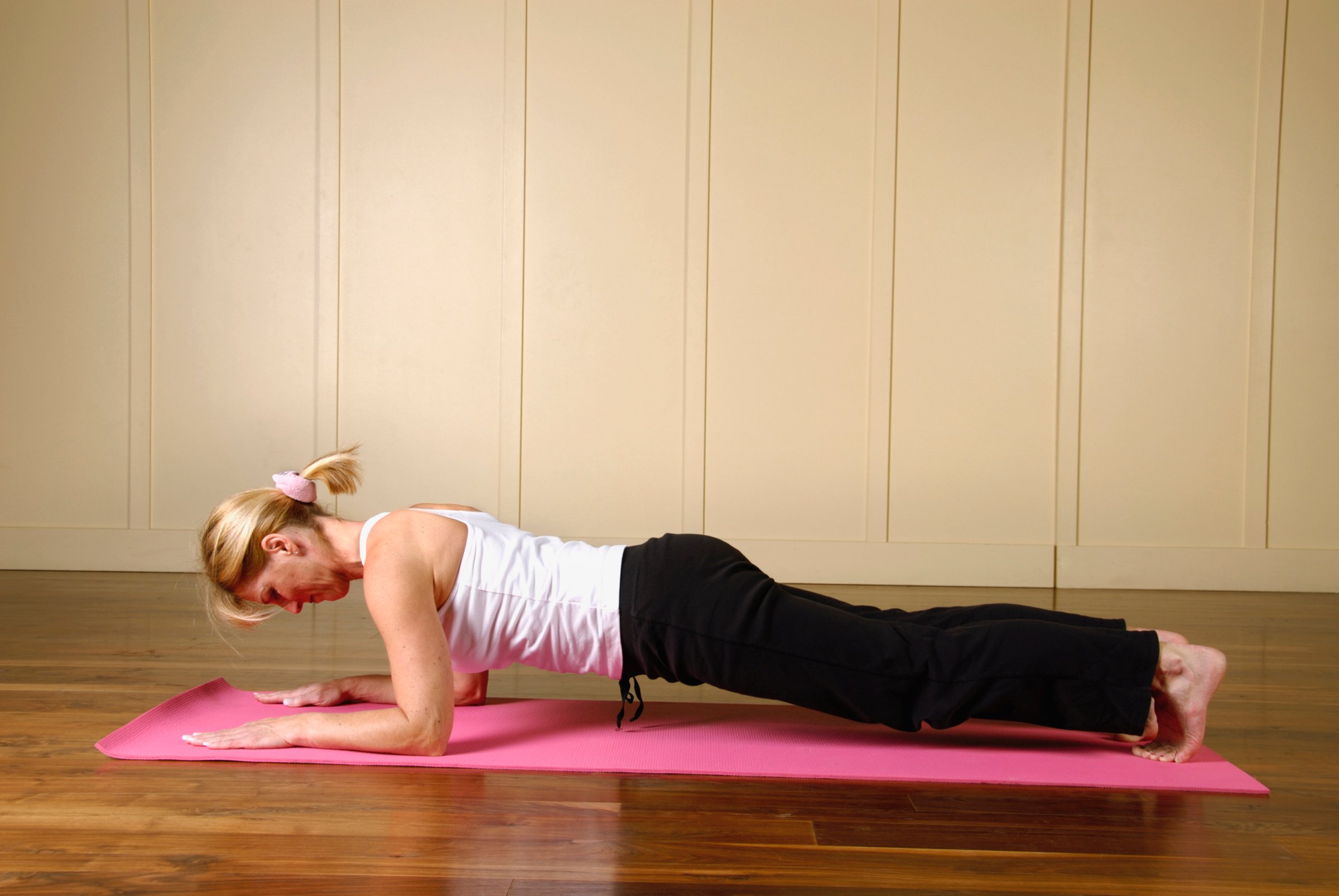
The key to preventing back pain is to strengthen your core and release tension and tightness in the muscles around your upper and lower back. Plus, back pain can often be the result of stress. Yoga will help you relax and unwind mentally and these poses will continue to keep your core strong, your back supported, and your muscles lengthened and released.
Health.com: 15 Natural Back Pain Remedies
The first three yoga poses below connect us to our deep core muscles, which act as an inner girdle. When we tighten and tone our core, it helps us hold everything in and prevents us from straining our back. The last two are great for releasing tension in the upper and lower body. Tight shoulders can cause an achy upper back and tight hips pull on the lower back.
Try incorporating these poses regularly to keep your spine healthy, back strong, core engaged, and joints flexible.
Bird Dog
Start on hands and knees and imagine you have a glass of water on your lower back and one between your shoulder blades. Without spilling any water, reach your right arm forward and your left leg straight back behind you. Hold here for 30-60 seconds bracing your core. Come back to all fours before switching sides. Repeat 3 to 5 times on each side.
Health.com: 12 Yoga Poses for Non-Flexible People
Boat
Sit tall your knees bent and your feet on flat on the floor. Hinge back without rounding in the lower back as you lift your legs out in front of you at a 45-degree angle. Keep drawing our lower abdominals in and up and lengthen out of your lower back. Hold here for 5 to 8 breaths. Lower down and repeat 2 more times.
If this is too challenging with your legs straight, you can bend your knees so the shins are parallel to the floor.
Forearm Plank
If you only have time for one pose, this is the ultimate core move. It really works the entire midsection, deep core muscles and the back, waist, hips, legs, buttocks, arms, and shoulders.
Lie on your and place your elbows under your shoulders, tuck under your toes and press firmly through the back of your legs and heels. Engage your lower abs and tighten your core as you lift your body up off the floor coming in to one straight line of energy from head to toe. Don’t let your ribs splay open or your butt sag or lift too high. Hold for 45-60 seconds then lower down. Repeat 2 to 3 more times.
Health.com: 25 Exercises You Can Do Anywhere
Cow Face Pose
Start on all fours and slide your right leg over your left leg high at the upper thigh. Sit back between your heels and adjust your hips so they are even distance from each foot. Lift your left arm overhead and bend the elbow so the hand comes down between your shoulder blades. Reach your right arm behind your back and up towards the left hand try and touch the fingers or clasp the hands. If you can’t connect your hands, use a towel or strap. Recline forward over your legs and hold for 5 to 8 breaths. Come up move back on to all fours and repeat on the opposite side.
This pose will stretch out tight external rotators, hips, and buttocks as well as shoulders and upper back.
Camel Pose
Tight hip flexors can pull on the lower back and are often the result of sitting for too long of periods. Camel is an excellent counterpose to the slouched forward position we often assume. Camel opens up the entire front body while stretching the shoulders and front of thighs, hip flexors, quads and psoas muscles.
Health.com: Which Type of Yoga is Best for You?
Come in to a kneeling position with your toes tucked under. Place your hands on your lower back and try and slide your tailbone down towards the floor to lengthen your lower back. Lift your chest up and drop your head back as you reach for your heels (if this places any strain on the back keep your hands on your lower back). Hold and breathe for 5 breaths then lift up. If you want to challenge yourself further repeat the pose with the toes flat on the floor. The goal is to open up the chest and stretch the front of the body while lengthening out of the lower back. Use the strong abdominal muscles you found in the first three postures to support the backbend.
Kristin McGee is a leading yoga and Pilates instructor and healthy lifestyle expert based in New York City. She is an ACE certified personal trainer who regularly trains celebrity clients in New York and Los Angeles. She serves as Health’s contributing fitness editor and is frequently seen on national TV.
More Must-Reads from TIME
- Why Trump’s Message Worked on Latino Men
- What Trump’s Win Could Mean for Housing
- The 100 Must-Read Books of 2024
- Sleep Doctors Share the 1 Tip That’s Changed Their Lives
- Column: Let’s Bring Back Romance
- What It’s Like to Have Long COVID As a Kid
- FX’s Say Nothing Is the Must-Watch Political Thriller of 2024
- Merle Bombardieri Is Helping People Make the Baby Decision
Contact us at letters@time.com